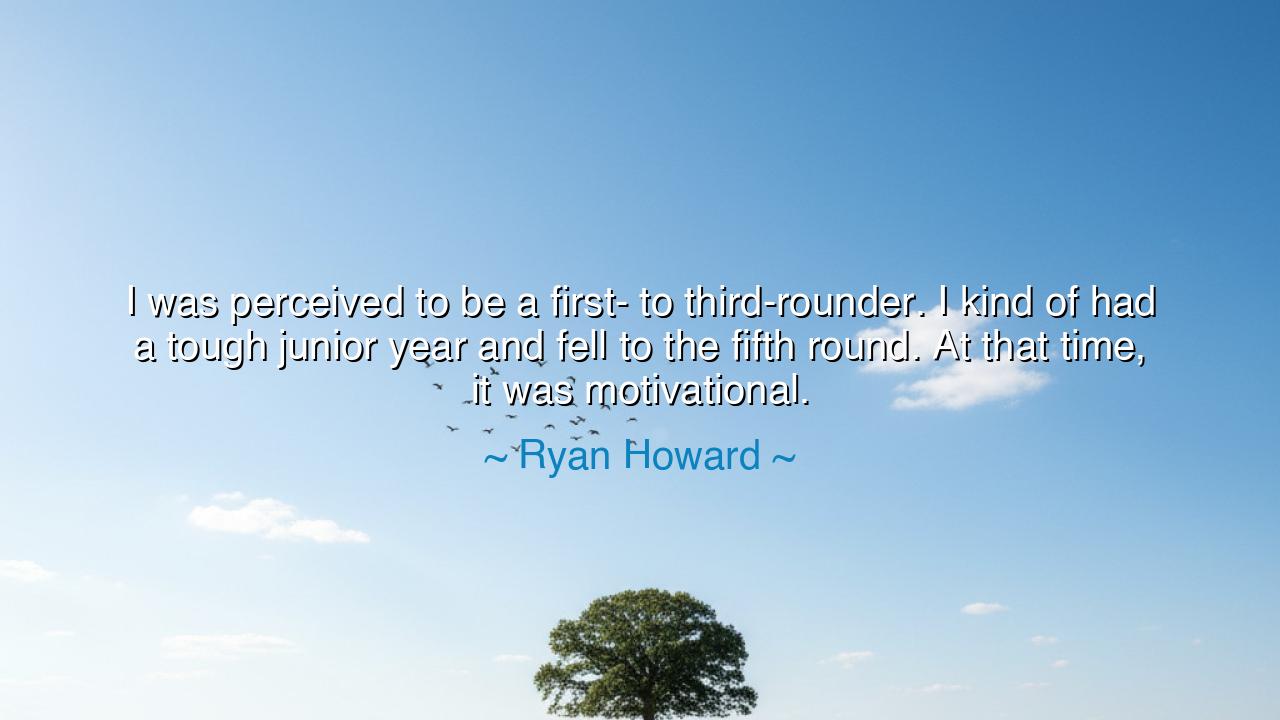
I was perceived to be a first- to third-rounder. I kind of had a
I was perceived to be a first- to third-rounder. I kind of had a tough junior year and fell to the fifth round. At that time, it was motivational.






Hear the words of Ryan Howard, a man whose bat thundered across ballparks, yet whose spirit was first tested in disappointment: “I was perceived to be a first- to third-rounder. I kind of had a tough junior year and fell to the fifth round. At that time, it was motivational.” This confession, born of trial, speaks to the eternal rhythm of life: that we are not always given the honor we expect, nor the crown we are told is ours, but through rejection and delay, the fire of perseverance is kindled.
At the heart of Howard’s words lies the sting of expectation unmet. To be seen as a first-rounder, then to fall to the fifth, is to feel the weight of lowered esteem in the eyes of the world. Many would crumble under such a blow, allowing bitterness to sap their resolve. But Howard, like the heroes of old, took the wound and made of it a weapon. He transformed disappointment into motivation, using the doubt of others as the very fuel that propelled him toward greatness. This is the alchemy of the determined soul—turning humiliation into power, setback into strength.
History is filled with those who rose higher because they were first cast low. Consider Abraham Lincoln, who failed in business, lost elections, and endured repeated defeats before rising to become one of America’s greatest presidents. Or recall Michael Jordan, who was cut from his high school team and later said that failure was the seed of his fire. In each story, as in Howard’s, rejection was not the end but the beginning of resilience. What seemed like a curse became a gift, shaping character sharper than victory ever could.
Howard’s words also reveal a wisdom that is deeply human: that the measure of a person is not taken in the moment of triumph, but in the moment of setback. Anyone can rejoice when expectations are met, but greatness belongs to those who face defeat and still rise. By calling his draft position motivational, he shows that even wounds can carry within them the seed of destiny—if one is willing to use them rightly. Thus, failure is not the enemy, but the forge.
There is humility here as well. For Howard admits, “I kind of had a tough junior year.” He does not hide behind excuses, but names his own struggles. This honesty makes his story even stronger, for it teaches us that admitting imperfection does not weaken us—it allows us to see where we must grow. The fall to the fifth round was not only the judgment of others; it was also a reflection of his own difficulties. Yet by embracing that truth, he gained the clarity and drive to rise again.
The meaning, then, is both heroic and practical: disappointment is inevitable, but its effect upon us is a choice. We can allow it to break us, or we can allow it to motivate us. Howard chose the latter, and in so doing, carved out a career that silenced the doubters and proved that the round of one’s selection does not determine the measure of one’s legacy. His story reminds us that setbacks are not the walls of destiny, but the stepping stones toward it.
What lesson, then, must we take from Howard’s words? It is this: when the world underestimates you, let it drive you, not defeat you. When expectations falter, build your own. See every rejection not as a verdict, but as an invitation to rise higher. For in truth, many of the greatest victories are won not by those chosen early, but by those who refused to be broken when chosen late.
Thus let it be remembered: perceived value is not true value; disappointment can become motivation; and the strength of a soul is revealed not in being exalted, but in enduring the fall. May Howard’s story be a torch for all who feel overlooked, reminding them that the round in which you are chosen does not define the heights you may yet reach.






AAdministratorAdministrator
Welcome, honored guests. Please leave a comment, we will respond soon